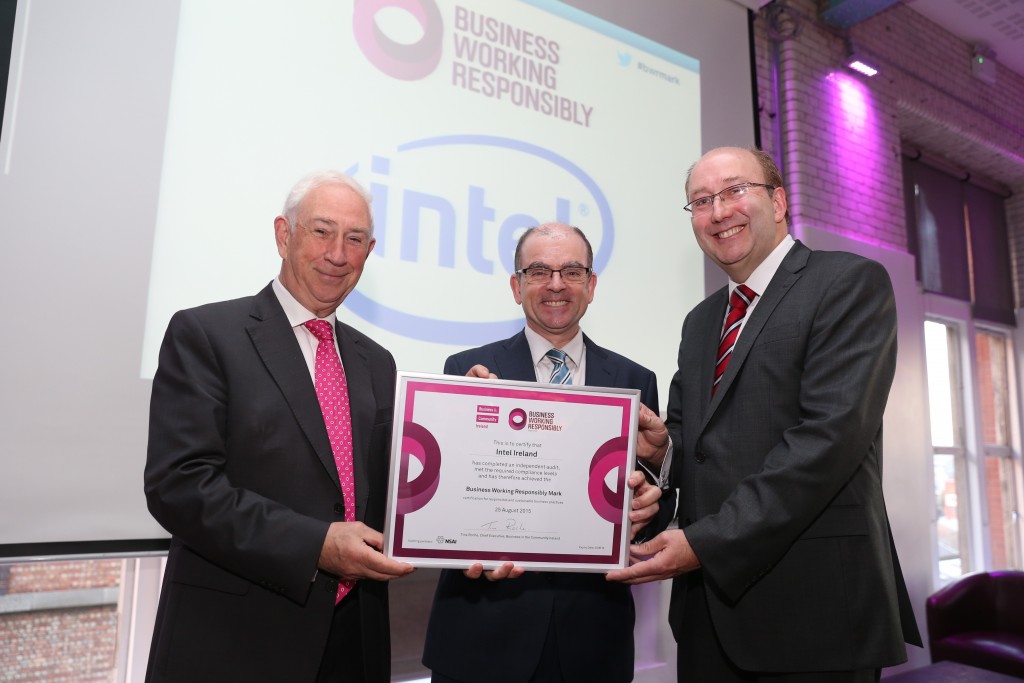CSR is just the way Intel do business

Pictured from left Kieran McGowan Chairman BITCI with Leonard Hobbs Director Global Public Affairs Intel accepting the Mark for the third time and Maurice Buckley CEO NSAI
Don’t go to Intel looking for someone to talk you through its corporate and social responsibility practice. You won’t find it. “We don’t do CSR. It’s just the way we do business,” explained Brendan Cannon, director of corporate affairs at the technology giant’s Leixlip campus.
“There was a time when it was called CSR,” he admitted. “But over the last five years, things like volunteerism, ethical supply chain, diversity in the workforce are just what we do. We have integrated CSR into the work of our company and its employees. It’s called out at top level. Caring for our people, for the planet, for the next generation, is one of our four strategic objectives as a company.”
It’s for this reason that CSR isn’t separated out and handed over to a particular division. “At Intel this agenda is driven not so much by peer pressure, but through peer support. There’s no point in having one exemplar, we all have to be in on this.”
It is this holistic view of CSR that led the company to work with Business in the Community to achieve the prestigious Business Working Responsibly Mark, the gold standard in terms of good corporate citizenship.
“We believe that if you can’t measure something you can’t manage it,” said Cannon. “The Mark allowed us a way of measuring all our activities on this front.”
One of the key ways in which Intel works to ensure it is a good corporate citizen is by fostering diversity. “We invest in our people because we want to have the best people possible and we know that the research shows that diverse teams are more successful and are at less risk of falling into poor business practices such as ‘group think’,” said Cannon.
At Intel, it isn’t enough to simply hire diversely however. “We have to go further than that, and help create a more diverse pool in the wider community,” he explains.
The result of that has been a proliferation of work in the community to help encourage females to study so called STEM (science, technology, engineering and maths) subjects throughout their education.
It matters. “For many years we have seen that there hasn’t been enough diversity in the tech sector. Yet studies have shown that diverse boards are typically 30 – 40 per cent more profitable, because diverse teams come up with better solutions,” he said.
“Our aim is to have a 50/50 mix in gender terms, but we have to hire from the market. Where there are qualified women, we look to hire them. But you can’t hire them if they are not there, so our challenge is that it’s simply not enough to say we want a diverse workforce, we have to go out and help create a diverse pool to recruit from.”
While Intel is at the leading edge of best practice in relation to such activities, the work it undertook to win the Business Working Responsibly Mark exposed areas in which it could do even better.
“It identified some gaps in our performance, one of which was, for example, the area of local representation among suppliers. We worked with our procurement teams, both on our site at EMEA level to see how the company can include ‘local’ suppliers, where possible, in our policies,” said external affairs manager Lisa Harlow.
Being Intel, they decided to take this one step further. “We then started to look at women in our supply chain, with a view to improving it. We began looking at the idea of encouraging women-led businesses, where women represent 51% of the board, by trying to increase our spend with them.”
“We’re a very large technical manufacturer, with over 4,500 people working in a plant that we have just upgraded – having spent $12.5 billion on it over past 25 years. With all that comes a footprint. It’s vital that we not just monitor and control, but continuously improve on that footprint in relation to carbon emissions, water and waste and, indeed, in relation to our suppliers’ footprint too.”
Working with its suppliers in this way has led to innovations developed in Ireland that can be rolled out at Intel worldwide, including, most recently, a cutting edge solution created for the Leixlip plant by its lighting supplier here.
“We actively look to find opportunities for innovative companies that will enable us to have greener buildings,” said Cannon.
Achieving the Business Working Responsibly Mark was a vital external validation of such corporate citizenship activities.
“Engineering is at the heart of the company, so we love measurement systems. The Mark provided us with an opportunity to undergo rigorous third party testing which showed us that we were best in class in a number of areas, good at some, but could do better in others,” he said.
Winning the Mark also means getting “an official stamp of recognition which is very important to us,” he said. “It matters because when it comes to long term investment decisions, you want to bet on companies that are sustainable.”


